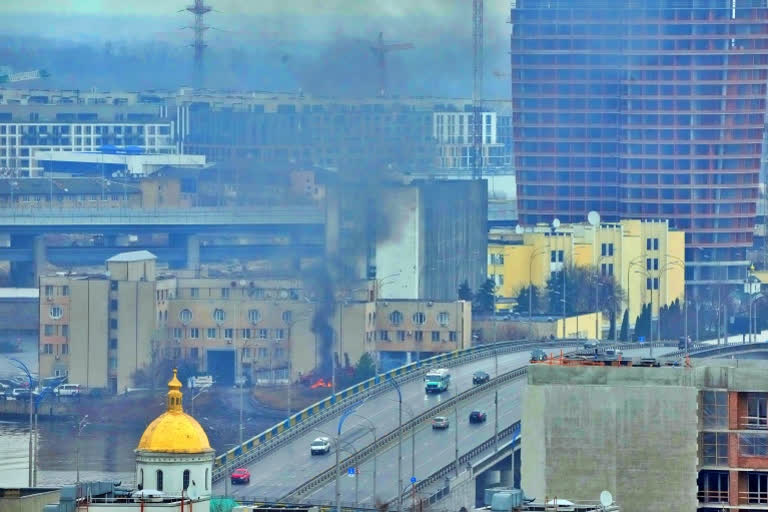New Delhi: The sudden Thursday morning Russian military action on Ukraine with attacks on major cities has presented India with a grand opportunity that it should seize with both hands. On Wednesday, Roman Babushkin, Charge d’Affaires at the Russian Embassy in New Delhi said: “Russia welcomes the Indian position expressed several times in this regard because India is acting according to its status of a global power and takes a balanced and independent position.”
On Thursday, Ukrainian ambassador to India Igor Polikha sought India’s active intervention. “We are expecting a much more favourable attitude of the Indian government in this crisis situation. It is the moment of truth. The moment of destiny... We are waiting, asking pleading for the assistance of India.”
Russia praising India’s stand on the unfolding crisis in Ukraine and the Ukrainian ambassador to India at New Delhi seeking Indian intervention is an underlining of the ties that India enjoys with both sides. Prime Minister Modi also held talks with Russian President Vladimir Putin on Thursday night, post a meeting with his top ministers including home minister Amit Shah, defence minister Rajnath Singh and finance minister Nirmala Sitharaman.
Also read: Ukraine War: India wants peace, no situation promoting war should arise, says Rajnath Singh
Besides being a major supplier of edible oil to India, Ukraine has been a dedicated supplier for spares and parts of many Indian military equipment and platforms— a legacy of the Soviet era relationship with India. On the other hand, Russia has been India’s tried and tested friend for the last eight decades. Now the deep cooperation has further been extended to 2031 by an agreement in December 2021. About 60 percent of Indian weapons, platforms and systems are already of Russian origin.
On the surface, India faces a Hobson’s choice. Choosing to bolster Ukraine would earn it the ire of Russia while choosing to back Russia would annoy the US and the West. Both these positions would adversely impact the Indian economy and the security dynamics and are therefore not viable ones.
With sanctions being imposed by the US-led bloc including the European Union (EU), there is a strong possibility that Russia along with China and a few other nations that may include Iran, may try to erect an alternative economic collective—substantially reducing Indian maneuvering space.
Also read: Amid Ukraine war, Pak PM Imran Khan meets Putin, says 'what a time...so much excitement'
What Can India Do?
In that case, the only position that would prove advantageous for India is to provide an interactive platform for both sides. “The old position of non alignment (NAM) has been given up by India. Prime Minister Modi has given the NAM meets a miss. India’s present position, if it continues with it, will result in neither US nor Russia taking India into total confidence, says Prof Kumar Sanjay Singh, who teaches history at a Delhi University college.
"At the UN, it has already twice abstained from voting against Russia on the Ukraine issue. The best and the only role that is available for India is to play the mediator as it enjoys the confidence of both the warring sides,” adds Singh, a keen observer of strategic developments.
The role India can play is by setting up a group of similarly positioned countries that lie at the periphery of these two power blocs that have emerged. The ideal move will be to broker a deal between Russia and the EU. Because if a deal can be worked out between Russia and the EU, then a deal can be worked out between Russia and the US too.
Also read: Berlin, Korea, now Ukraine: Russian tactic at play
Some like-minded countries that can form the group with India could be UAE, Hungary, Brazil etc. Already the economies of Russia and EU are integrated and intertwined in a number of ways the decoupling of which would only be detrimental to all sides concerned. What would also help India in stepping in is the fact that India enjoys a very good relationship with the big three of EU, namely, France, Germany and Italy.
If that can be achieved which is feasible and manageable, then a face-saving middle ground is possible, which in turn can result in developments where the US-Russia hostility can also be subdued. It is perhaps the need of the hour to put the goodwill that India enjoys with these countries to work and establish a firm foothold in the comity of nations.



